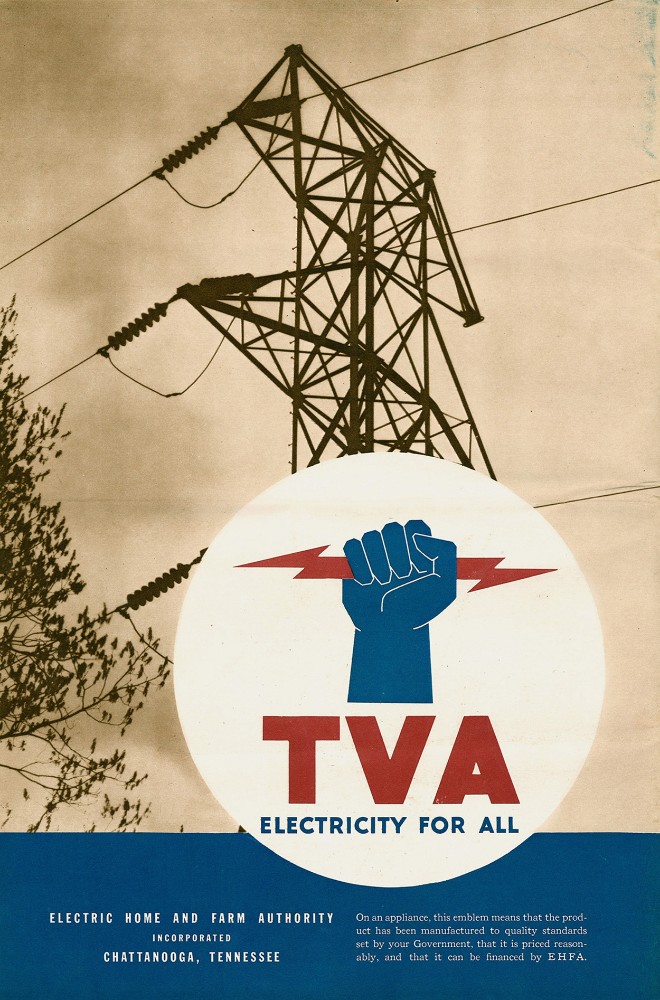Displaying items by tag: renewable energy
Welcome to the Heat Dome
 An area of high pressure lingered in the upper atmosphere over the U.S. Midwest and Northeast in June 2024. This pushed warm air toward the surface and trapped it there—a weather phenomenon meteorologists call a heat dome. The heat wave reached the Southern Appalachians, as seen in this model generated from NASA Earth Observatory data. NASA
An area of high pressure lingered in the upper atmosphere over the U.S. Midwest and Northeast in June 2024. This pushed warm air toward the surface and trapped it there—a weather phenomenon meteorologists call a heat dome. The heat wave reached the Southern Appalachians, as seen in this model generated from NASA Earth Observatory data. NASA
How climate change is heating up the weather, and what we can do about it
This article was originally published by The Conversation.
The heat wave that left more than 100 million people sweating across the eastern U.S. in June 2024 hit so fast and was so extreme that forecasters warned a flash drought could follow across wide parts of the region.
Prolonged high temperatures can quickly dry soils, triggering a rapid onset drought that can affect agriculture, water resources and energy supplies. Many regions under the June heat dome quickly developed abnormally dry conditions.
(The average temperature of June was about 7 degrees above normal in Knoxville as reported by Weather Underground).
The human impacts of the heat wave have also been widespread. In Ohio and Pennsylvania, emergency room visits for heat-related illnesses surged. Several Massachusetts schools without air conditioning closed to protect kids and teachers. In New York and New Jersey, electric wires sagged in the heat, shutting down trains into and out of New York City and leaving commuters stranded.
- flash drought
- june heatwave
- heat and public health
- impacts of extreme heat
- solutions to extreme heat
- heat deaths
- drought
- climate connection to heat
- renewable energy
- air conditioning
- coping with extreme heat
- science of heat
- climate change heat
- climate change sociology
- home cooling
- jeffrey basara
- mathew barlow
- umass lowell climate science
The electric-vehicle revolution brings environmental uncertainty at every turn

As demand for electric vehicles soars, several roadblocks have emerged
This article was originally published by The Revelator.
Manufacturers, governments and consumers are lining up behind electric vehicles — with sales rising 60% in 2022, and at least 17 states are considering a California-style ban on gas cars in the years ahead. Scientists say the trend is a key part of driving down the transportation sector’s carbon emissions, which could fall by as much as 80% by 2050 under aggressive policies. But while EVs are cleaner than gas cars in the long run, they still carry environmental and human-rights baggage, especially associated with mining.
“If you want a lot of EVs, you need to get minerals out of the ground,” says Ian Lange, director of the Energy and Economics Program at the Colorado School of Mines.
New year. Old challenges.

From plastic pollution to extreme weather and the extinction crisis, the year ahead promises tough fights, enormous challenges and critical opportunities
This story was originally published by The Revelator.
A new year brings with it new opportunities — and more of the same environmental threats from the previous 12 months.
You’ve got the whole world in your hands

Personal climate-change remedies have a wide cumulative impact and are part of the solution, so don’t give up
Tom Ptak is assistant professor of Geography and Environmental Studies at Texas State University. This story was originally published by The Conversation.
The average American’s everyday interactions with energy sources are limited. They range from turning appliances on or off, to commuting, to paying utility bills.
The connections between those acts and rising global temperatures may seem distant.
However, individuals hold many keys to unlocking solutions to climate change — the biggest challenge our species currently faces — which is perhaps why the fossil fuel industry spent decades misleading and misinforming the public about it.
I’m an assistant professor of geography and environmental studies at Texas State University. My research explores how geography affects the complex relationships between societies, energy and contemporary environmental challenges. I’ve found that the human element is critical for developing creative, effective and sustainable solutions to climate challenges.
There’s a large and growing body of evidence showing that individuals can have a major impact on climate change in a number of ways. Citizen action can compel utilities to increase renewable energy and governments to enact strong climate action laws. When enough individuals make changes that lower daily household energy consumption, huge emissions reductions can result. Consumer demand can compel businesses to pursue climate and environmental sustainability.
These actions combined could bridge the “emissions gap”: the significant difference between the greenhouse gas emissions expected globally and how much they need to drop in the next few decades to avoid catastrophic climate change.
- climate change
- individual action
- personal responsibility
- energy consumption
- energy conservation
- geoengineering
- consumer choice
- consumer demand
- citizen action
- citizen participation
- public participation
- climate leadership
- emission reduction
- collective action
- carbon emission
- renewable energy
- energy efficiency
- fuel consumption
- weatherization
- energy use
Clean-energy advocates take demands to base of TVA towers and power
 Alex Pulsipher holds a sign demanding that TVA transition to 100 percent renewable energy at a rally Wednesday in Market Square in Knoxville. Courtesy Amy Rawe/Southern Alliance for Clean Energy
Alex Pulsipher holds a sign demanding that TVA transition to 100 percent renewable energy at a rally Wednesday in Market Square in Knoxville. Courtesy Amy Rawe/Southern Alliance for Clean Energy
Varied environmental groups offer unified plea for clean energy, coal ash management and accountability from TVA
It was people power generating energy at Market Square in downtown Knoxville on Wednesday.
A coalition of civic and environmental groups and their representatives met at the bottom of the two Tennessee Valley Authority towers urging the public utility to reopen meetings to public comment; swear off all fossil fuels by 2030; and carefully tend to the needs of those affected by coal ash and devise a plan to contain it for the safety of current and future generations.
- tva clean energy
- coal ash
- kingston coal ash spill
- southern alliance for clean energy
- kingston coal ash worker
- tva coal ash
- sunrise movement
- appalachian voices
- sierra club
- tennessee valley authority
- accountability
- public comment
- tva board meeting
- carbon reduction
- climate action
- carbon free by 2030
- renewable energy
FGS calls on TVA to get serious about addressing the climate crisis
As Hellbender Press reported in April, the Tennessee Valley Authority plans to phase out its use of coal. And as we mentioned in an action alert, TVA is conducting a scoping process pertaining to the preparation of an Environmental Impact Statement (EIS) for retirement and replacement of the Kingston Fossil Plant. TVA is preparing similar EIS for its other remaining coal-fired power plants as well.
Although TVA lists "construction and operation of solar and storage facilities" in these scoping documents as an alternative for replacement of coal as the power source, it has made no secret of its belief that construction of gas-powered combustion turbines (CT) and natural gas pipelines to feed them will be the best solution to replace the outdated generation capacity.
Unlike other power utilities, TVA has been making it more difficult, financially unattractive or impossible for distributed renewable energy, storage and even efficiency projects to get realized, according to proponents of renewables and some of TVA’s local power distribution partners. TVA also reneged on its agreement with other utilities to make large amounts of wind power available to the Southeastern United States through the Plains & Eastern Clean Line high-voltage direct-current power line project.
- tennessee valley authority
- tva
- foundation for global sustainability
- fgs
- climate change
- climate crisis
- electric utility
- power plant replacement
- fossil fuel
- coalfired power plant
- gasfired power plant
- gas pipeline
- kingston fossil plant retirement
- distributed electricity generation and storage
- distributed energy resource
- solar energy
- power storage
- stranded asset
- germany
- renewable energy
- decarbonization
- plains & eastern clean line
Tell TVA: Don’t replace Kingston Coal with new fossil gas plants or pipelines!
 Remember TVA’s 2008 Kingston Fossil Plant coal fly ash slurry spill
Remember TVA’s 2008 Kingston Fossil Plant coal fly ash slurry spill
The Tennessee Valley Authority plans to retire the Kingston plant and its four other remaining coal-fired power plants by 2035.
But it is seriously considering replacing them with large fossil gas power plants and new gas pipelines!
Natural gas is cleaner than coal, but is yet another fossil fuel source that releases carbon dioxide. Such a replacement would be contrary to the national and global consensus that we must reduce the use of fossil fuels quickly to constrain the runaway climate crisis as much as we can.
A plan based on emerging technologies for increased energy efficiency combined with distributed use of renewable energies and energy storage can increase community resilience; create more good, long-term jobs; diversify local business opportunities; and provide immediate public health benefits.
TVA accepts public comments electronically through the end of July 15, 2021.
Don’t miss the opportunity to tell TVA that customers don’t want to pay for a yesteryear “solution” that does not really address the clear and present dangers to humanity. The Southern Alliance for Clean Energy has made it easy for you:
Submit your comment to TVA by tapping or clicking this link NOW:
Tell TVA, No New Fossil Gas Plants + Pipelines
You can also email TVA directly attn: Chevales Williams, This email address is being protected from spambots. You need JavaScript enabled to view it.
Source: TVA — Kingston Fossil Plant Retirement
- kingston fossil plant retirement
- tennessee valley authority
- tva
- coalfired power plant
- peaker power
- fossil fuel
- decarbonize
- electric power
- electric power plant
- kif
- fossil gas power plant
- natural gas
- power plant replacement
- coal ash spill
- coal fly ash slurry
- public comment
- renewable energy
- southern alliance for clean energy
- carbon dioxide
- co2
- energy storage
- distributed electricity generation and storage
- battery storage
- climate crisis
Solar panels required on every new roof in Berlin after 2022
PV Magazine & BO Klima: Berlin macht Solardächer zur Pflicht
The rooftop solar law, passed on June 16, says every new building and substantial renewal of an existing building’s roof must be equipped with solar panels covering at least 30 percent of the roof surface.
The German capital — which is on the same latitude as Labrador City — intends to become more climate friendly. It wants to act as a role model for other municipalities and states in how to accelerate the energy transition. It aims for solar to cover 25% of its electricity consumption.
The city contends, the solar potential of its roofs has gotten inadequate consideration and expects the new law will create many future-proof jobs in planning and trades.
Building owners may opt to use solar facade panels or contract with third parties to build and operate equivalent solar capacity that fulfills the mandate elsewhere in the city. But critics of the law say it does not address how to optimize its implementation with present practices, regulations, and tariffs. They predict, this law will be inefficient and costlier than other methods to stimulate renewable energy generation.
Bavaria, for example, launched an incentive program that awards combined new solar and battery storage installations. Applications for that program have multiplied quickly and now are deemed likely to surpass the 100,000 installations mark by the end of its third year.
Germany, whose entire southern border is farther north than Quebec City or Duluth, has a long history of technology and policy leadership in renewable energies. In 1991 the German Electricity Feed-in Act was the first in the world that mandated grid operators to connect all renewable power generators, pay them a guaranteed feed-in tariff for 20 years and prioritize these sources.
Tell TVA by THURSDAY: No new fossil gas plants!
The Tennessee Valley Authority (TVA) recently announced plans to retire its five remaining coal-fired power plants by 2035.
However, it is seriously considering replacing them with large fossil gas power plants and new gas pipelines!
That’s like “two steps forward, one step back.”
TVA could take many more steps forward by prioritizing clean energy.
TVA’s new gas plan is not final, and the time to influence our public utility is now!
Click here to tell TVA, No new fossil gas plants!
Comment deadline is June 10
In historic move, Tennessee Valley Authority finally swears off coal; are power replacements up in the air?
“Our intelligence and flexibility as a society will be tested as the financial and industrial giants all figure out what they’re going to do.”
The Tennessee Valley Authority intends to phase out its aging fleet of coal plants by 2035, potentially replacing the age-old carbon-rich power source with increased use of natural gas and refreshed, concentrated supplies of nuclear energy as the vast utility moves to drastically reduce its greenhouse gas emissions.
The plan emerged Wednesday, about a month after the Biden administration called on the U.S. power sector to eliminate pollutants linked to climate change by 2035.
The Tennessee Valley Authority is the largest public provider of electricity in the United States. It provides wholesale power to every major municipal provider in Tennessee, as well as other metropolitan areas and smaller utility districts and cooperatives within its seven-state service area.
ORNL scientists fan out to local schools and bring their research home during National Environmental Education Week
 Students listen to a presentation from an Oak Ridge National Laboratory researcher during National Environmental Education Week. Courtesy Oak Ridge National Laboratory
Students listen to a presentation from an Oak Ridge National Laboratory researcher during National Environmental Education Week. Courtesy Oak Ridge National LaboratoryScientists link research to students’ lives and communities
(Editor’s note: Karen Dunlap is a public information officer at Oak Ridge National Laboratory).
Esther Parish is one of eight Oak Ridge National Laboratory scientists talking to students in nine schools across East Tennessee as part of National Environmental Education Week.
On Monday, she spoke to Cathy Kimball’s fifth-grade class at Lenoir City Middle School.
The discussion covered renewable energy resources, science career paths and how climate change may affect East Tennessee.
Other ORNL scientists, including Debjani Singh, Liz Agee, Shelaine Curd, Spencer Washburn, Colleen Iversen, Keith Kline and Matthew Langholtz are participating in classroom events through April 30.
The national event is organized by the National Environmental Education Foundation (NEEF), which celebrates environmental education.
“I think it is important to reach out to young people about environmental science because the choices that our society makes regarding renewable energy resource development and climate-change mitigation will have long-term effects on their environment, health and future quality of life,” Parish said. She is a member of ORNL’s Environmental Science Division and specializes in geography and landscape ecology.
Electric Vehicle Virtual Ride & Drive with race car driver Leilani Münter
Apr 24 1-2 p.m. EDT
Natural Resources Defense Council and Southern Alliance for Clean Energy
Zoom Webinar - Free and open to the public - RSVP
Leilani will take us through the paces in her electric car and explain why she’s an advocate for electric transportation powered by clean energy. Following the virtual ride, Leilani will answer live questions posed by viewers. Make sure to register to hold your reservation.
Tracking Decarbonization in the Southeast: 2021 Report
Apr 21 1–2 p.m. EDT
Heather Pohan & Maggie Shober, Southern Alliance for Clean Energy
Webinar - Free and open to the public - more details and RSVP
“Tracking Decarbonization in the Southeast: Generation and CO2 Emissions,” a report developed by the Southern Alliance for Clean Energy, examines the role electric utilities have played in decarbonizing the power supply over the last decade. The report examines power sector carbon dioxide emissions throughout the Southeast, home to some of the biggest utility systems in the nation.